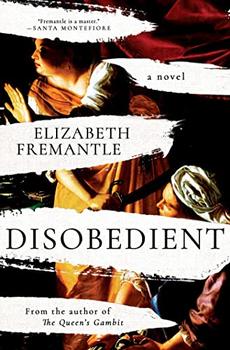Summary | Excerpt | Reviews | Beyond the book | Read-Alikes | Genres & Themes | Author Bio

A Novel
by Elizabeth FremantleBorn in Rome in 1593, Artemisia Gentileschi led a successful career as an artist throughout the early 17th century. In recent years, she has come to be regarded by many as one of the most influential and talented artists of the era. However, her career was almost over before it even began, when, aged just 17, she was raped by fellow artist Agostino Tassi. At this time, Christian society was wholly unforgiving when it came to women accused of being engaged in any form of sexual activity outside of wedlock, as it was tied to the social stigma surrounding prostitution. Gossip spread quickly throughout her community, with Gentileschi soon dubbed an immoral "whore" by former friends and neighbors. Her family's reputation in ruins, she was faced with three options: marry her rapist, take Holy orders, or take Tassi to court for his crime and attempt to clear her name. Gentileschi chose the latter, even while knowing the law favored the accused, with women forced to prove they were victims of sexual violence not only under oath, but under torture.
It is a difficult task to imbue real events with the dramatic flair of fiction without sensationalizing them, but author Elizabeth Fremantle strikes a sensitive balance. She also does well to showcase Gentileschi's inherent rebellious nature and more modern outlook from the beginning, establishing her as a young woman unafraid to challenge the norm. By age 17, for example, when the majority of the novel is set, she already regularly stands up to her father's drunken temper, in a time when children – especially girls – are expected to toe the line. The author also has Gentileschi show complete acceptance of her best friend Piero's homosexuality. These quiet yet powerful rebellions pave the way for her later determination to bring the truth to light following the assault, a mission that forms the crux of the novel.
There are further layers to her decision to go to trial, however. Early chapters lay out just how difficult it was for women to advance their standing — be it financially or socially. Greatly limited in terms of education and employment opportunities, they were regarded in many ways merely as commodities to be passed from fathers to husbands. Following her rape, Gentileschi is all too aware of the impact it will have on those she loves: "her virtue is the whole family's business." As such, her fight to clear her name is not just for her own benefit, but for her father's and brothers' too. The selfless nature of her actions makes her resolve even more poignant.
The prose pays tribute to the subject's art in its own subtle yet effective way, painting vivid scenes with words much like Gentileschi would with her brush. Specifically, there is often a focus on describing the colors of a scene, a nice nod to the artist's celebrated use of intense color in her work to add depth. More generally, passages of rich, descriptive text call to mind the sumptuous, detailed quality of Gentileschi's paintings:
"The cobbles in the piazza, slick and dark, are spotted with fallen almond blossom that has gathered in wet drifts. The rain thins to a fine mizzle and the sun forces a few rays through a break in the clouds, gilding the far rooftops, making the scene like a painted backdrop. A distant shadow moves fast towards them, transforming, as it nears, into a flock of starlings. They land on the wet ground in a chaos of oily black, moving, flitting, gossiping, taking off once more into the air, each bird seeming part of some secret unifying harmony."
Despite capturing a sense of time and place so well, and sticking closely to factual accounts of the events, Fremantle keeps her focus firmly on the personal, human aspect of Gentileschi's story, lending it a timeless, universally relatable quality. Consequently, Disobedient is just as likely to stir passionate art historians as it is those who have never heard the name Artemisia Gentileschi before.
![]() This review was originally published in The BookBrowse Review in September 2023, and has been updated for the
December 2023 edition.
Click here to go to this issue.
This review was originally published in The BookBrowse Review in September 2023, and has been updated for the
December 2023 edition.
Click here to go to this issue.

If you liked Disobedient, try these:

by Xochitl Gonzalez
Published 2025
New York Times bestselling author Xochitl Gonzalez delivers a mesmerizing novel about a first-generation Ivy League student who uncovers the genius work of a female artist decades after her suspicious death

by Emily Howes
Published 2025
A "beautifully written" (Hilary Mantel) story of love, madness, sisterly devotion, and control, about the two beloved daughters of renowned 1700s English painter Thomas Gainsborough, who struggle to live up to the perfect image the world so admired in their portraits.
Your guide toexceptional books
BookBrowse seeks out and recommends the best in contemporary fiction and nonfiction—books that not only engage and entertain but also deepen our understanding of ourselves and the world around us.